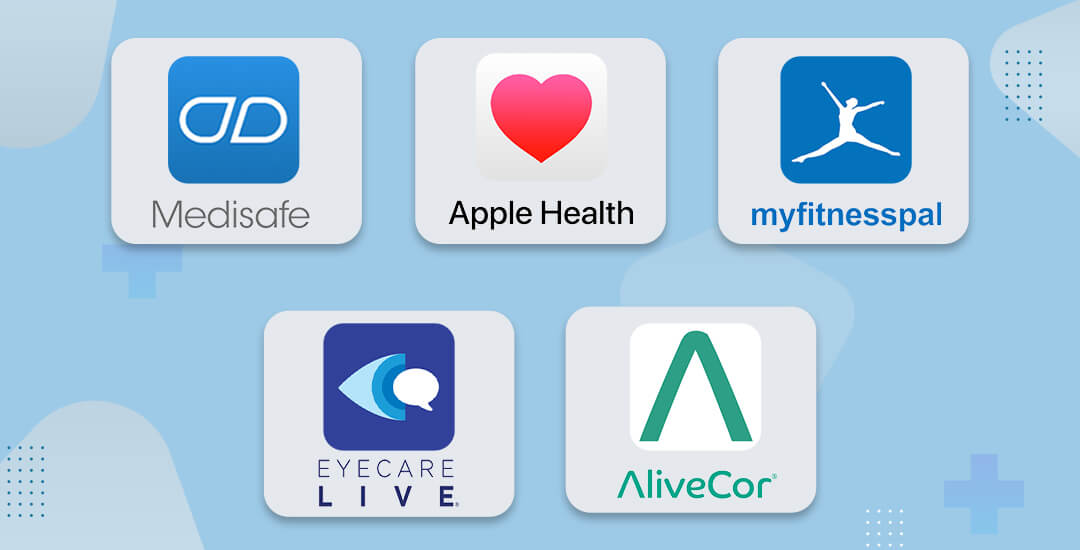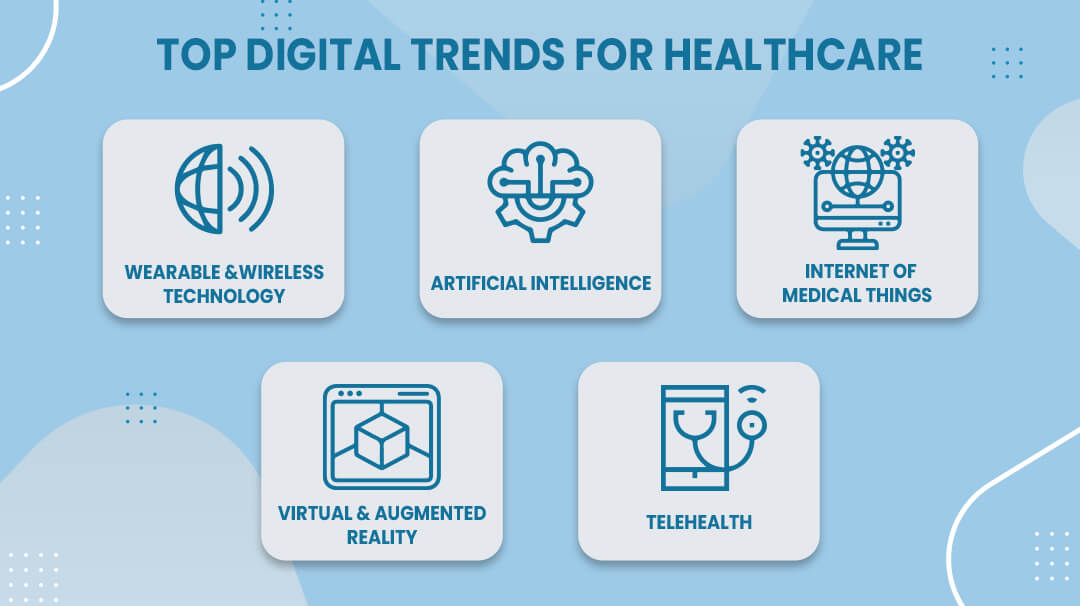Healthcare is a fundamental necessity that can’t be altered. Starting with home remedies during earlier times, gradually health care centres emerged.
Although, the pace and standard have reached a different level since the digital transformation in healthcare. The digitalization of hospitals has impacted both servers and receivers of the healthcare service constructively.
Digital Health Technology has been a hike up of quality and cost-effective healthcare for appointments, diagnosis, medications, surgeries, and much more.
This Digital transformation is grabbing a place in healthcare, but still, certain impacts hold it back. Let’s have a look at how Digital Healthcare is shaping up and the prospects.
Digital Transformation In Healthcare Statistics
Impacts of Digital Technology in Healthcare are diversified. Doctors and healthcare providers have observed a gradual rise in their potential to serve patients.
This potential has led the market of digital healthcare market share to exceed USD 141.8 billion in 2020. By 2020, the digital health industry has observed the largest amount of investment that is 21.6 billion US Dollars.
COVID 19, accelerated the use of virtual space to cease transmission. Hence, people started adopting digital healthcare services.
Even if digital health might be preferred but an inconvenient digital experience turns the users off. Concerns over security and trust persist. Even, use of new tools can be difficult for day-to-day clinical workflows.
Top 5 Digital Healthcare Apps in 2021:


Digital Healthcare and Its Trends
Digital Healthcare is a broad subject that comes from the intersection of technology and healthcare services. Digital transformation to healthcare includes computing platforms, connectivity, software, and sensors.
The wide concept of digital health services includes Mobile health apps, Electronic health records, electronic medical records, telehealth, wearable devices, and telemedicine including personal medicines.
Benefits of Digital Transformation in Healthcare
- Overall improvement in patient’s treatment and care
- The efficiency of medical service providers
- Automotive management of large data
- Time and cost-effective communication channels
- Minimal risk of human errors
Top Digital Trends For Healthcare:

1. Wearable and Wireless Technology
1. This technology is used for monitoring the health of the user. Doctors can observe the shared information and diagnose with minimal time and errors.
2. These are preventive health care devices used by the patient to monitor their internal conditions. Some devices like the Apple watch sends real-time alerts to doctors and relatives if the person experiences atrial fibrillation.
3. According to a survey by HIMSS, more than half of physicians prefer commercial and personal-grade wearables. These devices are used to monitor health conditions and track medications.
2. Artificial Intelligence
1. AI is a cost-effective way to serve health care. This system can complete simple and time-consuming tasks, which helps doctors to focus on more complicated ones.
2. It also increases diagnoses efficiency because a large amount of data can be interpreted by AI in just a few seconds. Medical officials can analyze accurately and quickly start the treatment.
3. AI can assist patients with personalized care through this technology. These AI’s features help to improve the overall patient’s experience with healthcare.
3. Internet of Medical Things
1. IoMT is a real-time technology that brings information from medical devices and applications used by patients to healthcare technology systems.
2. By using networking technologies IoMT can reduce unnecessary hospital visits. It decreases the burden on healthcare systems and uses a secured network for data transfer.
3. IoMT is used in smart devices like Wearables and medical monitors. These devices are used for healthcare on the body, home, community, and Hospitals.
4. Virtual and Augmented Reality
1. These two technologies have helped both doctors and patients extensively. Many things which seemed challenging before have become a lot easier.
2. VR has been assisting doctors to practice complex surgeries without risking a person’s life. Even robotic surgery and emergency treatments increase the accountability of healthcare.
3. For Patients, AR and VR are used as therapy for disorders like Alzheimer and PTSD. By creating a controlled stimulus, the therapist can have favorable results.
5. Telehealth
1. This technology is a solution for facilitating people’s connection to healthcare providers.
2. In the space developed by telehealth medical Professionals can evaluate, diagnose and treat patients without personal meetings.
Top-Notch Successful Companies of Digital Health
Some of the renowned Digital healthcare service providers include Alivecor, FabRX and DeepMind. These are the top three companies in the digital health industry. Alivecor holds expertise for handheld, connected ECG devices that fit in the user’s pocket.
Further, FabRX is known for the best innovative and reliable healthcare technologies. DeepMind brings Artificial Intelligence to healthcare services. Other top companies in this industry are, Cellink, Natural Machines, CloudmedX, Not Possible labs, and many more.
Challenges For Healthcare Digital Solutions
Digital Transformation of Healthcare services has elevated the affordability, accountability, and efficiency of medical services. But there are some setbacks to the technology.

1. Cyber Security
1. Digital Healthcare Industry is a platform that facilitates patients’ treatment. But to integrate with doctors people have to share personal information.
2. People generally fail to trust digital space due to security fallbacks.
3. Doctor & patient personal data should be secure under HIPAA complaints. Digital healthcare solutions should secure the data on mobile devices via a client-server model.
2. Overcomplicated Functioning
1. Making the digital health care solutions feature-rich demands a great number of functions. These features aren’t easy and quick to comprehend.
2. In between daily rush and work pressure, medical professionals find it draining to learn complex functions.
3. User-Unfriendliness
1. Complicated functions and difficult technological jargons used for digital healthcare make medical professionals resistant to it.
2. Even patients find it a little weary for understanding the apps or software.
4. Budget Restrictions
1. The development of medical services technology is costly and demands great investments. Not many medical organizations have a large sum of funds.

Prospective Digital Healthcare Solutions
Although all challenges might not be resolved, there are some ways to overcome most of them. These solutions could help people accept the Digital Hospital of the Future.
1. Complete adoption of Blockchain in Future Digital Health Care
1. The fundamental step is to set up a blockchain. It is simply a system of recording information in a way that it stands with no chance to be hacked or changed.
2. Implementation of Blockchain in healthcare services will build a sense of trust and transparency among users. Countries like Australia have already adopted the technology.
3. Blockchains are also able to create a decentralized place where members can access information. This technology can curb down accessibility issues.
4. An implemented blockchain can prevent security lags that leak personal information, allow patients to access and add their information and identify inaccuracies in patients’ data.
2. Develop functionally-rich yet user-friendly technologies
1. People look at digital transformation as a positive change. But the complexity of usage stops them from utilizing it appropriately.
2. With market research that could highlight changes in layout and features, developers can be able to create a user-friendly platform.

Conclusion
Digital transformation in healthcare services has ignited leverage of quality services by medical organizations. Patients have a better experience and healthcare services providers can work easily. Widely, People have started using these technologies.
There are a lot of technological advancements, yet challenges persist. Still, digital transformation is grabbing its place in healthcare services at a great pace. With the prospective solution, transformation can overcome the majority of challenges and disclose a whole new face of Healthcare.
Auxano Global Services is a bespoke mobile app development company having ample experience in digital healthcare solutions. Our dedicated development team has immense expertise in health app features, targeting audience, industry needs, and the latest technology in the healthcare industry. We have helped several health startups with next-gen digital solutions such as fitness mobile apps, tracking apps, online billing software, online medicine store development, and wearable solutions.
If you want to create digital solutions for your business, then Contact us now.
Frequently Asked Questions
-
1. What is digital transformation in healthcare?
Digital Health Technology has been a hike up of quality and cost-effective healthcare for appointments, diagnosis, medications, surgeries and much more.
-
2. What is the need for digital health transformation?
Digital transformation in healthcare services has ignited leverage of quality services by medical organizations. Patients have a better experience and healthcare services providers can work easily. People have started using these technologies.
-
3. What are the top digital trends for healthcare?
There are many digital trends that are improving healthcare services in the modern era such as Wearables and wireless technology, IoMT (Internet of Medical Things, AR, VR, TeleHealth, and Artificial Intelligence.
-
4. What is the Internet of Medical Things?
IoMT is a real-time technology that brings information from medical devices such as wearables & wireless devices, and applications used by patients to healthcare technology systems.
-
5. How Blockchain technology helps digital health services?
Implementation of Blockchain in healthcare services will build a sense of trust and transparency among users. Countries like Australia have already adopted the technology. Blockchains are also able to create a decentralized place where members can access information for data safety.
-
6. Which is the best Healthcare app development company?
Auxano Global Services is a leading mobile app development company having vast experience in digital healthcare solutions and successful medical app development. Our dedicated development team can decode your complex idea into masterpiece digital solutions. We have helped several healthcare startups with amazing mobile app development, custom CMS development, and personalized enterprise mobility solutions. Contact us now.



![How to Outsource Application Development? [2021-2022]](https://www.auxanoglobalservices.com/agsresources/wp-content/uploads/2021/09/How-to-Outsource-Application-Development-2021-2022.jpg)

